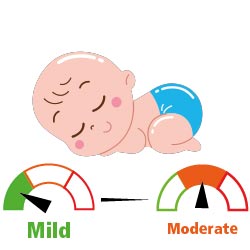Rx
Notes
In emergency
Disease annotations
Rx
- Avoid exposure to allergen
In excessive nasal secretions (Rinorrhea,sneezing,itching):
- Pedia fast 0.01g/100ml syrup 1 teaspoonful (5 ml) 3-4 times daily
In nasal obstruction:
- Decozal 0.05% spray /drop 1drops in each nostrils up to 3 times daily
Notes
Dimetindene
Available forms:
- Fenistil: drop 1mg/1ml, 4mgcaps, 1mgtab
- Pedia fast: drop 0.1g/100ml, 0.01g/100ml syrup
- Alergin: drop 1mg/1ml (1 ml = 20 drops).
- Fencil: drop 1mg/1ml
- 1 ml contains dimetindene maleate 1 mg (1 ml = 20 drops).
Therapeutic indications
- Symptomatic treatment of allergic diseases:
- Skin: Urticaria, pruritus of various etiology, endogenous eczema with previous medical diagnosis.
- Respiratory system: Seasonal (hay fever) and perennial rhinitis with previous medical diagnosis.
- Relieve of itching associated with infectious diseases (e.g. chickenpox) with previous medical diagnosis or after an insect bite or stings.
Dose:
1mg/1ml oral drops, 0.1g/100ml drop:
- Adults :The recommended daily dose is 3 – 6 mg of dimetindene maleate divided into 3 doses,
- 20 –40 drops 3× a day.
- Paediatric The recommended daily dose for children 1 – 11 years is 0.1 mg dimetindene maleate/kg body
- 2 drops/kg/day divided into 3 doses.
1mg tablet:
- 1 to 2 milligrams three times daily
0.01g/100ml syrup:
- the recommended dose is 1 teaspoonful (5 ml) of a 0.01g/100ml syrup 3-4 times daily
4mg capsule :
- 1capsule once daily
Contraindications :
- Hypersensitivity to the active substance or to any of the excipientsInfants and children under 1 year of age.
pregnancy and lactation :
- Pregnancy There are no data about the use of dimetindene maleate during pregnancy.
- Dimetindene maleate should not be used in pregnant women unless the benefit of treating the mother outweighs the risk for the foetus
Breast-feeding :
- There is a well-founded presumption that dimetindene can be excreted in human milk. So its not recommended.
Side effect :
- Fatigue
- Somnolence, nervousness
Otrivine
Otrivine Nasal Spray contains the active ingredient xylometazoline hydrochloride which helps to open up and clear the nasal passages by reducing the excessive nasal secretions and returning the swollen blood vessels to their normal size.
Used in :
- nasal congestion (blocked nose, including colds)
- allergic rhinitis
- sinusitis.
- Not used>5 days Cause rebound congestion
Pregnancy : not recommended
Available forms:
- Otrivin 0.1% spray/drop , .05% spray /drop
- Decozal 0.1% spray/drop , .05% spray /drop
- Xylomet 0.1% spray
Dose:
Adult
- 0.1% Nasal drop 2-3 drops in each nostrils up to 3 times daily
Child>6y
- 0.05% Nasal drop 2-3 drops in each nostrils up to 3 times daily
Child 6months-6y
- 0.05% Nasal drop 1drops in each nostrils up to 3 times daily
In emergency
In Emergency room:
- Give Antihistamine In sneezing and rhinorrhea :
- Allerfin 10mg/ml IM injection :
Dose:
- 1-5 year : 25-5mg (½ ml )
- 6-12 year: 5-10mg (1ml )
- Adult : 10-20 mg (1-2 ml )
- Give Dexamethasone 4mg/1ml
Dose:
Pediatrics:
- 0.3 mg/kg/day IV / IM divided q6hr or q12hr
Adult:
- 4-8 mg IM /IV
Disease annotations
Allergic rhinitis
Presentation :
- Rhinorrhea
- Repetitive sneezing
- nasal congestion, obstruction
- postnasal drainage
- Pruritus
- Itching of the palate, nose, ears, eye
- Snoring
- Frequent sore throats
- Cough
- Headache
- Itching redness watery eyes
Lines of management :
- Avoid exposure to allergens
- In excessive secretions and sneezing: oral antihistamine
- If nasal obstruction: Nasal decongestant
- For ocular symptoms: intranasal antihistamine
- If Symptoms persist and affect quality of life: Intranasal Corticosteroid
- Sever and persistent symptoms: Intranasal Corticosteroid + oral or intranasal antihistamine+ Oral leukotriene receptors antagonist
